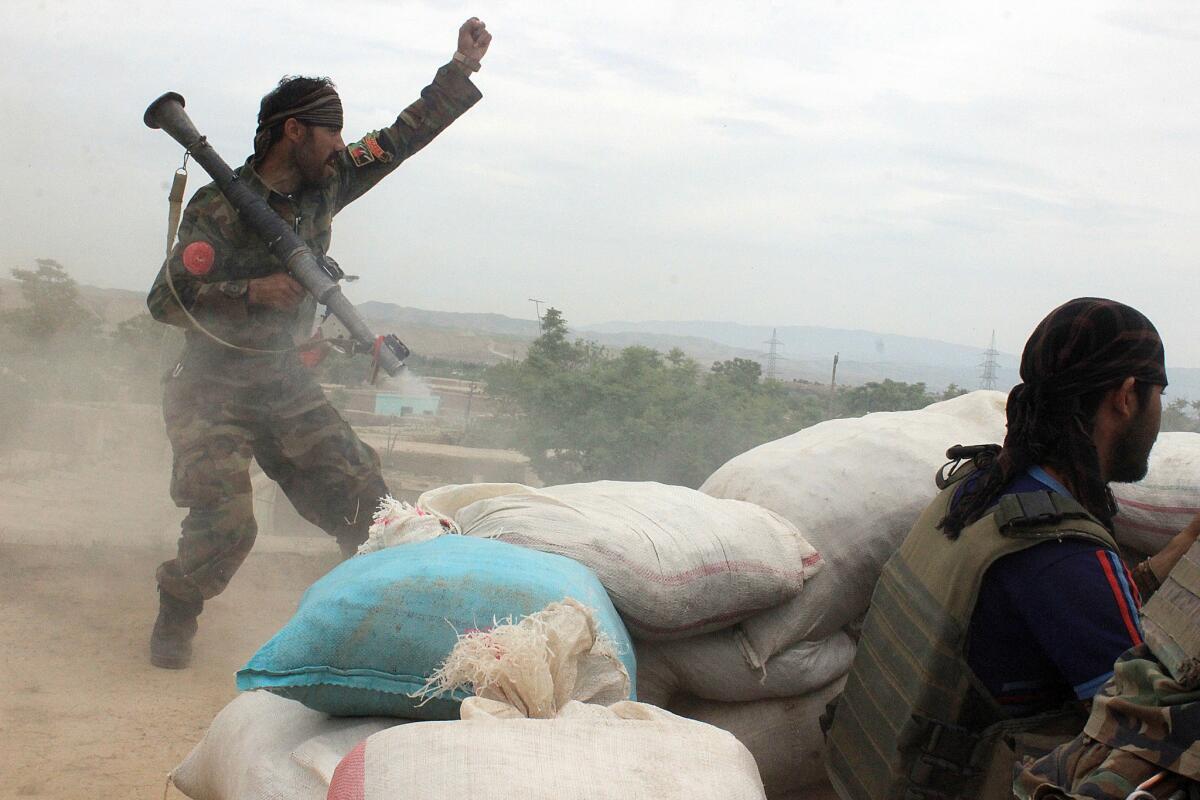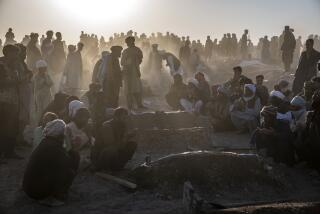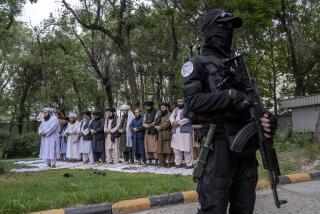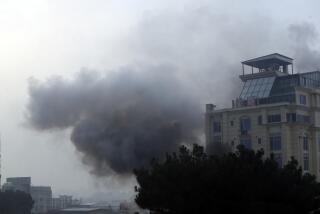The Taliban’s spring offensive is on, but Afghan forces make gains near strategic city

An Afghan National Army soldier shouts against the Taliban after firing a rocket toward its positions on the outskirts of Kunduz, northern Afghanistan, on Saturday.
Elite Afghan troops battled Sunday to clear Taliban fighters from a highway outside a strategic northern city as residents fled their homes under threat of further violence.
Afghan security officials say special forces have so far repelled a Taliban advance that began Thursday outside the city of Kunduz, which the Taliban took over for two weeks last fall, sparking a major crisis of confidence in the government.
Residents say the Taliban have made inroads in several districts surrounding Kunduz, the country’s fifth-largest city. Inside Kunduz, families were trying to leave the city, and in several villages within two miles of the city, residents said the Taliban ordered them to flee their homes immediately “or they will be stuck inside war zones,” one said.
The renewed fighting comes less than a week after the Taliban announced the start of its annual spring offensive, which will once again test the ability of Afghanistan’s 350,000-strong security forces to hold on to strategic territory across northern and southern Afghanistan. Local media have reported fighting in at least 10 of the nation’s 34 provinces in recent days, including three in the north — Kunduz, Badakhshan and Baghlan.
Residents said the offensive in Kunduz began late Thursday evening when Taliban fighters took control of several checkpoints along the highway connecting Kunduz with the district of Khanabad, about 12 miles to the east.
Afghan forces responded with ground operations and airstrikes, according to residents. By Sunday afternoon, Afghan special forces began operations to clear the highway, with security officials saying government troops had killed at least 40 Taliban fighters.
Reportedly among the dead were two prominent Taliban commanders in the area known as Mullah Habib and Mullah Mansoor. The Taliban did not immediately confirm the reports.
In the village of Alchin, on the outskirts of Kunduz, a witness said he said he saw two dead Taliban fighters near an army outpost.
Residents in the nearby village of Hazarat-e Sultan, four miles from Kunduz, reported seeing U.S. special forces soldiers in the area in recent days. A small contingent of U.S. troops deployed to Kunduz last year to help Afghan forces retake the city, part of the smaller NATO mission focused on training and advising Afghan troops.
NATO officials did not immediately respond to questions about the reported U.S. involvement. Mullah Akhtar, a commander of the Afghan Local Police, a U.S.-backed government militia, said U.S. soldiers were in Kunduz recently but did not engage in combat.
“They were here for a few days, but they left suddenly, without any notable achievement or success,” Akhtar said.
As in previous battles in Kunduz, militias loyal to local warlords assisted the security forces in the fighting, especially in Khanabad. The return of the militias — which are not under the formal control of the government — has reignited fear in residents, who accuse the irregular fighters of extortion, illegal land grabs, rape and assault.
One commander, Mir Alam Khan, leads a militia that was described in a leaked 2009 State Department cable as being connected to the Afghan intelligence service but seemingly operating “without government guidance, command or control.”
More than 2,000 families from the villages have been displaced as they seek shelter from the fighting. Many paid their way through Taliban checkpoints along the highway to reach Kunduz, and some said they would try to travel farther, to the cities of Mazar-i-Sharif or Kabul.
Last year’s Taliban takeover of Kunduz left thousands of families without electricity or mobile phone access, stuck in their homes with little information as Taliban militants reportedly went door to door searching for people suspected of having government connections.
One resident of Kunduz, who did not give his name because of security concerns, said areas outside the city were the most susceptible in the latest clashes.
“Even a few kilometers outside the city, people are not hopeful,” the resident said. “They fear the situation will only get worse in the days and weeks ahead.”
Latifi and Ehsan are special correspondents. Latifi reported from Kabul, Afghanistan.
More to Read
Start your day right
Sign up for Essential California for news, features and recommendations from the L.A. Times and beyond in your inbox six days a week.
You may occasionally receive promotional content from the Los Angeles Times.






